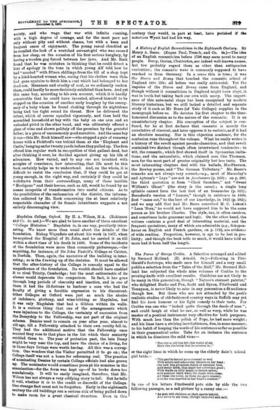Magdalen College, Oxford. By H. A. Wilson, MA. (Robinson and
Co. 5s. net.)—We are glad to have another of these excellent "College Histories." Magdalen is, in one way, peculiarly inter- esting. We know more than usual about the details of the foundation. Bishop Waynflete set about his work in 1457, when he acquired the Hospital of St. John, and he carried it on till within a short time of his death in 1486. Some of the incidents of the foundation were more than commonly picturesque,—the acquiring, for instance, of Sir John Fastclf's College at Caistor, in Norfolk. Then, again, the narrative of the building is inter- esting; so is the drawing up of the statutes. It must be allowed that the after-history of the College is scarcely equal to the magnificence of the foundation. Its wealth should have enabled it to rival Trinity, Cambridge; but the most enthusiastic of its alumni would deprecate the comparison. In fact, it has gone through long periods of obscurity and inaction, and in one of them it had the ill-fortune to harbour a man who had the faculty of giving a forcible expression to his discontent. Other Colleges at Oxford were just as much the abodes of indolence, gluttony, and wine-bibbing as Magdalen, but it was only Magdalen that had a Gibbon within its walls. It is a curious thing that one of the arrangements which were injurious to the College, the -certainty of succession from the Demyship to the Fellowship, was not part of the original scheme. Demies used to remain on year after year, almost to old age, till a Fellowship attached to their own comity fell in. They had the additional motive that the Fellowship once secured they rose to that place in the list which their seniority entitled them to. The year of probation past, the late Denny might be very near the top, and have the choice of a living, for in those days livings were worth having. All this was a corrup- tion. One wonders that the Visitor permitted it to go on ; the College itself was not a home for reforming zeal. The practice of nominating Demies by certain College officials had also grown UP. The nominator would sometimes prompt his nominee in the examination—for the form was kept up—if he broke down too scandalously. It will be easily imagined, therefore, that Mr. Wilson has not always a very edifying story to tell. But he tells it well, whether it is to the credit or discredit of the College. One strange -fact must not be forgotten. Early in the eighteenth century the old buildings ran a serious risk of being pulled down to make room for a great classical structure. Even in this
century they would, in part at least, have perished if tin notorious Wyatt had had his way.






















































 Previous page
Previous page